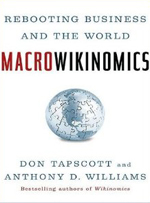 This article is part of a series written by Don Tapscott and Anthony D. Williams, authors of the newly released book Macrowikinomics: Rebooting Business and the World. Mark Parker, the CEO of Nike calls it "A masterpiece. An iconic and defining book for our times." The Economist says it's a "Schumpeterian story of creative destruction."
This article is part of a series written by Don Tapscott and Anthony D. Williams, authors of the newly released book Macrowikinomics: Rebooting Business and the World. Mark Parker, the CEO of Nike calls it "A masterpiece. An iconic and defining book for our times." The Economist says it's a "Schumpeterian story of creative destruction."
The book argues that many of the institutions of the industrial age have finally come to the end of their lifecycle, and are now being reinvented around a new set of principles and a networked model.
Today's blog looks at the benefits of Wikinomics applied to the energy grid.
****
Humanity's ability to transform raw materials into energy powered the rise of modern civilization and shaped the fortunes of nations throughout history. James Watt's steam engine triggered the industrial revolution in Britain and ushered in a period of enormous technological, social and economic transformation. Roughly a century later, the invention of electricity and the eventual electrification of factories brought large-scale business enterprises and double-digit increases in productivity that transformed the United States into the modern economic powerhouse.
Today, the world stands at the brink of a new energy revolution -- one that will fundamentally transform the ubiquitous but largely invisible infrastructure that powers every home appliance, every medical device, every light source, and virtually every industrial process, from agriculture to construction. The fossil-fuel-based economy is coming to an end and a new green-energy economy is emerging in its place. Like past energy revolutions, there will be great payoffs for the countries and companies that master the new technologies early. The opportunity for new product and service innovation is huge, as is the potential for smart firms to create hundreds of thousands of new high-skill jobs in fields ranging from solar engineering to software.
But are we positioned to take advantage? To really tip the scale in favor of green energy, we need an infusion of Wikinomics principles. The need for cross-sector collaboration in developing and scaling new technologies is paramount. But we can and should go further. Truly opening up our energy infrastructure could catalyze new sources of supply, provide a platform for new energy services, and help foster a culture of energy "prosumption" whereby household and business users become active producers and managers of energy, not just passive consumers and ratepayers.
It's not as far-fetched as it sounds. There is already increasingly broad agreement that our electrical systems should do more than carry electricity. They should carry information. And once the grid carries information, it stands to benefit from the same kinds of innovation, collaboration, and wealth creation that the Internet has enabled in other sectors of the economy.
In many ways, the argument for a smart grid based on open standards parallels the argument for an open Internet. The old power grid is analogous to broadcast media with its bias towards centralized, one-way, one-to-many, one-size-fits-all communication. A smart grid, if it can be built, will leverage the Internet to weave millions, and eventually billions, of household appliances, substations and power generators around the planet into an intelligent and programmable network. And, just as open standards and "edge intelligence" brought forth creativity on the Internet, openness in the new energy grid will ensure it goes beyond being just a computerized pipeline for delivering cleaner electricity, and becomes a platform for a vast array of new energy services.
Building a smart grid on open standards would, for example, allow software developers to build applications just as developers build apps for the iPhone. The most straightforward application might analyze a household's electricity usage data, identify inefficient appliances or practices in the home, offer tips on how to reduce energy, and provide special discounts on efficient appliances or electronics. Armed with more information about tariffs, for example, the dishwasher would wait for the price to fall below a certain level before switching on, and the air-conditioner would turn itself down when the price goes up.
Innovations like these are especially exciting for the behavior changes they will bring about. Studies have found that when people are made aware of how much power they are using, they reduce their use by about 7%. With added incentives, people curtail their electricity use during peaks in demand by 15% or more. The Climate Group estimates that the application of digital technologies to enable smart grids and smart buildings has the potential to avert 3.71 gigatons of CO2 equivalent global emissions by 2020, delivering some $464 Billion in global energy cost savings to businesses, taxpayers and consumers.
These savings pale, moreover, in comparison to the impact we could have on future generations by transforming the way we produce and consume energy. In the face of climate change and diminishing stocks of fossil fuels, we can take one of two routes. One path leads to escalating prices, energy shortages, and economic backwardness in a world facing environmental catastrophe and increasing geopolitical conflict. The other path leads to growth, global cooperation, and an abundant supply of clean power delivered through a smart energy grid that enables consumers to become active and informed managers of their energy consumption. The choice is ours to make.
Macrowikinomics available at: Macrowikinomics.com
Follow Anthony Williams on Twitter: www.twitter.com/adw_tweets
